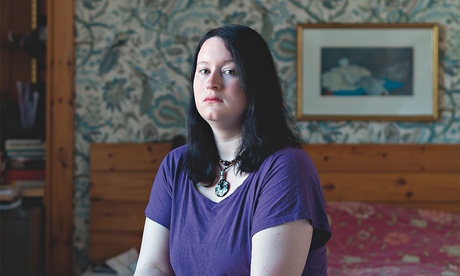
Ever since I was seven years old, my body clock has been set to "nocturnal". I'm happiest if I go to bed at 3am and wake up naturally at 12.30pm. If I try to go to sleep any earlier, I just lie awake, not remotely sleepy and only drop off when I reach my natural bedtime in the small hours. If I try to get up any earlier, it's not a matter of being "a bit tired"; I am barely able to function. I feel groggy, find it hard to concentrate and develop flu-like symptoms of aching joints and a pounding head. Having a nap brings temporary relief, but I'm back to square one the next night.
This caused enormous problems at school: I was getting less than half the 12 hours of sleep I needed and I would wander around in a daze, not taking anything in. In my fog of exhaustion, I found the classroom noise overwhelming. Soon I dreaded mornings and started having panic attacks. Eventually I refused to go to school altogether and my mum got hauled up before the head teacher. She was blamed for not being stricter about bedtimes, but in reality there was nothing she could have done. I used to creep down at night to watch television and read. My mum would get annoyed but she knew as well as me that there was no point trying to sleep because she had the same problem, never rising before 11am. This was fine for her as she is a painter and can work her own hours.
Psychiatrists diagnosed insomnia, anxiety and depression, and put me on Prozac. No one realised I would be perfectly happy if I stuck to my natural body clock. Eventually I was allowed to have classes in the afternoon with a home tutor, which was a huge relief. This enabled me to pass my exams and get a place at university, but once there, the problems started again. At first I forced myself to get up for 9am lectures, but after five mornings I was crying from exhaustion. I developed coping strategies such as researching the topics on my own and choosing courses with afternoon lectures, and passed my masters with distinction. It was a moment of triumph for me, proving I had resourcefulness and determination after all these years of being misunderstood and called lazy.
But still I wondered why I couldn't alter my body clock. I knew it ran in the family on my mother's side – as well as my mum, my granny had it, and my uncle never went to bed before 5am, but that didn't make it any easier to cope with. I have tried everything to change my sleeping habits – retraining myself by going to bed 15 minutes earlier each night, sitting in front of a light box in the morning, using lavender candles and cutting out caffeine – but nothing has worked. I even tried sleeping tablets, which put me to sleep earlier but didn't help with the morning zombie experience. One thing I haven't brought myself to try is chronotherapy, where you make your bedtime two hours later every night until you go right round the clock and are going to bed at a normal time. I'm reluctant as it's gruelling and there's no guarantee it will work.
It was while I was on the internet searching for new things to try that I discovered my condition has a name: delayed sleep phase syndrome. It's a circadian rhythm disorder where your natural sleep pattern is later than normal and hard-wired, meaning it cannot adapt. It brought some reassurance, but I was dismayed to discover there is no cure. I'd like to go to a sleep clinic to have it confirmed, but my doctor can't see the point since there is nothing you can do.
At the moment I'm not sure what career path I can take. Currently I am an extremely qualified night cleaner – I have two degrees, one in sociology, the other in computer programming, but haven't found work using either. When I apply for jobs I always ask if I could start work three hours later but no employer has been open to this. I find it enormously frustrating – it's not when you work that matters, but what you do. Luckily my partner is a night owl and happy to stay up with me, but previous boyfriends have had to leave me to sleep in while they got on with their day. I have learned to embrace the night hours – I love going for bike rides at 10.30pm, or wandering through foreign cities at 1am while on holiday. But I'd love to be one of those people who spring out of bed for breakfast rather than someone who wakes up for lunch.
• As told to Emily Cunningham
Do you have an experience to share? Email experience@theguardian.com

